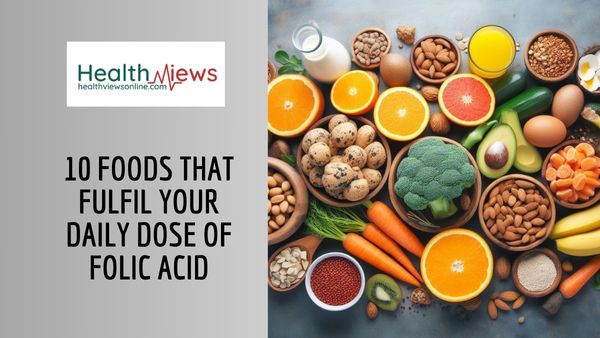Folate is a water-soluble B vitamin. It is naturally contained in some foods, added to others, and also accessible in supplement form. This vitamin is required for normal cell growth and metabolism. It specifically encourages correct fetal growth and development and supports healthy cell division to lessen the chance of birth malformations.
Vitamin B9 can be found naturally in many foods as well as in fortified foods such as folic acid. To avoid a deficit, healthy adults should consume at least 400 mcg of folate each day.
Also, Read Know All About Iodine: Functions, Recommended Amount, Sources, Deficiency,
Here are ten nutritious foods high in folate or folic acid
1. Legumes
Legumes are the fruits or seeds of any plant in the Fabaceae family, such as: beans, peas and Lentils
Although the amount of folate in beans varies, they are a good source of folate. One cup (177 grams) of cooked kidney beans, for example, contains 131 mcg of folate, or about 33% of the Daily Value (DV). Meanwhile, one cup (198 grams) of cooked lentils has 358 mcg of folate, which is 90% of the daily value.
Also, watch health views web stories: 8 Foods That Fulfill Your Vitamin A Dose
2. Eggs
Including eggs in your diet is an excellent method to increase your consumption of a variety of critical nutrients, including folate. One large egg contains 22 mcg of folate or about 6% of the DV. Even a few servings of eggs per week are an easy method to increase your folate consumption and help fulfill your needs.
Eggs also include a lot of protein, selenium, riboflavin, and vitamin B12. Furthermore, they contain high levels of lutein and zeaxanthin, two antioxidants that may help lessen the incidence of eye problems such as macular degeneration.
3. Leafy greens
Leafy green vegetables like spinach, kale, and rocket are low in calories but high in vitamins and minerals like folate. One cup (30 grams) of raw spinach contains 58.2 mcg or 15% of the daily value.
Green leafy vegetables are also abundant in fiber and vitamins K and A. They’ve been linked to a slew of health benefits. Consuming more cruciferous vegetables, such as leafy greens, has been linked to decreased inflammation, a lower risk of cancer, and enhanced weight loss.
4. Citrus fruits
Citrus fruits, such as oranges, grapefruit, lemons, and limes, are high in folate, in addition to being sweet and flavorful. One large orange provides 55 mcg of folate, which is roughly 14% of the daily value.
Citrus fruits are also high in vitamin C, a vital component that can help enhance immunity and prevent disease. In fact, observational studies have revealed that eating a lot of citrus fruits may lessen your risk of breast, stomach, and pancreatic cancer.
5. Nuts and seeds
Increasing your intake of nuts and seeds might also help you meet your daily folate requirements. The amount of folate in various nuts and seeds varies significantly. One ounce (28 grams) of walnuts contains approximately 28 mcg of folate, or approximately 7% of the DV, while one ounce (28 grams) of flax seeds contains around 24 mcg of folate, or 6% of the DV.
6. Papaya
The nutrient-dense tropical fruit papaya is native to southern Mexico and Central America. Apart from being sweet and flavorful, papaya is high in folate. One cup (140 grams) of raw papaya contains 53 mcg of folate or about 13% of the daily value.
Furthermore, papaya is high in vitamin C, potassium, and antioxidants such as carotenoids. Unripe papaya should be avoided by pregnant women.
7. Bananas
Bananas are a nutritional powerhouse, packed with vitamins and minerals. They’re particularly strong in folate and, when combined with a few other folate-rich meals, can easily help you achieve your daily requirements.
A medium banana contains 23.6 mcg of folate or 6% of the daily value. Potassium, vitamin B6, and manganese are among the other nutrients found in bananas.
Also, Read All About Sodium: Functions, Recommended Amounts, Food Source, Deficiency
8. Avocado
Avocados are a wonderful source of numerous key nutrients, including folate, in addition to their distinct flavor. One-half of a raw avocado has 82 mcg of folate, which is around 21% of the daily need.
Avocados are also high in potassium and vitamins K, C, and B6. They’re also strong in monounsaturated fats, which may help prevent heart disease.
9. Broccoli
Broccoli is well renowned for its numerous health-promoting benefits, and including it in your diet can deliver a variety of critical vitamins and minerals. One cup (91 grams) of raw broccoli contains around 57 mcg of folate or approximately 14% of the DV.
Cooked broccoli has significantly more folate, with each half-cup (78-gram) serving delivering 84 mcg, or 21% of the daily value. Broccoli also contains a lot of manganese and vitamins C, K, and A. It also contains a variety of beneficial plant components, such as sulforaphane, which has been extensively studied for its significant anti-cancer potential.
10. Fortified grains
Many grains, including bread and pasta, have been fortified to increase their folic acid content. The levels vary depending on the product, but one cup (140 grams) of cooked spaghetti contains about 102 mcg of folic acid or 25% of the DV.
Surprisingly, several studies have shown that folic acid in fortified diets is more easily absorbed than folate found naturally in foods. According to one study, folate in foods like fruits and vegetables is only around 78% as bioavailable as folic acid in fortified foods.
Folate is an important micronutrient that is abundant in your diet. Eating a range of healthful foods, such as fruits and vegetables, nuts and seeds, and fortified meals, is a simple approach to enhance your folate intake. These foods are not only high in folate but also in other important nutrients that can boost your overall health.
Also, watch health views web stories: 8 Foods That Fulfill Your Calcium Dose





